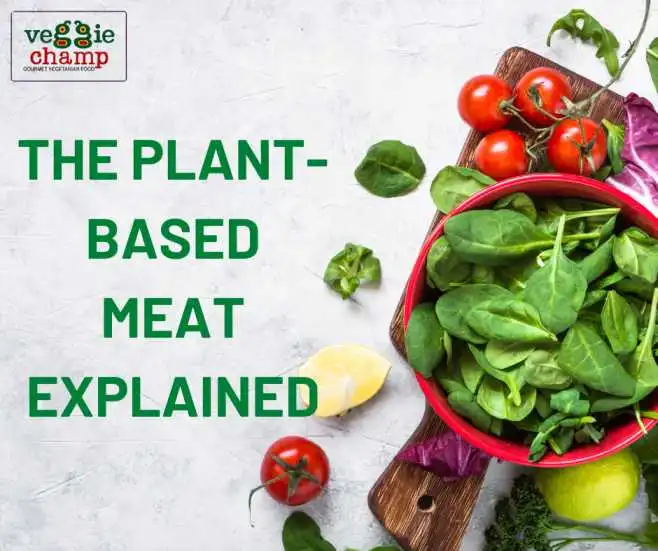
THE PLANT-BASED MEAT EXPLAINED
What Is “Plant-Based Meat”?
Meat substitutes manufactured from plants are called “plant-based meats,” They are meant to be an alternative to animal-based meats like hamburgers, steaks, bacon, nuggets, sausages, and fillets. Some are mainly prepared with veggies and lentils like your typical vegetarian burger. Others employ plant proteins and extracts, such as peas, soybeans, or wheat, to accurately simulate animal meat’s flavor, texture, and look, owing to technical improvements and inventive cooking. Many supermarket shops are stocking the very popular “bleeding” Impossible Burger in their meat section.
What Ingredients Go Into Plant-Based Meat?
Those unfamiliar with the phrase “plant-based meat” refer to Meat derived from plants. This is correct in principle, but there is more to it than merely forming a burger patty out of many plants. Plant-based meats are now available in a wide range of tastes and textures without slaughtering animals.
Some of the most popular ingredients in plant-based meats are soybeans, lentils, grains like quinoa, vegetable proteins like peas, coconut oil, and seitan.
The Process of Making Plant-Based Meat
To put it another way, how do these foods wind up on our tables? One thing that all plant-based meats have in common is that they are produced without the terrible pain and brutality that is inherent in industrial farming.
Even though plant-based meats are frequently criticized for being processed, Meat from animals is also processed. Factory farming is utterly unnatural. The Meat from these animals is tainted by various factors, including selective breeding, high antibiotic usage, and chemicals like chlorine to “sanitize” the flesh after the animal is slaughtered. Consequently, Meat is neither pure nor healthful.
Like any other kind of food preparation, making plant-based meats requires some amount of processing. Extrusion is a technique for making plant-based meats with a similar texture to animal-based Meat. In this extrusion procedure, proteins are heated and chilled before being cooked. Beyond Meat employs this method. On the other hand, heme is generated by yeast fermentation in the Impossible Burger.
Consumers may be certain that, unlike their animal-based counterparts, plant-based meat substitutes are not created in the same kind of inhumane conditions as their animal-based counterparts.
Plant-based meats tend to be lower in calories and saturated fat but higher in fiber than traditional meats.
Because plant-based meats are grown from plants and artificially flavored to resemble meat, they don’t include any animal products.
Because of their reduced levels of saturated fat and calories, plant-based meats are preferable to traditional meats.
Coconut oil, vegetable protein extract, and beet juice are all components of plant-based meats.
Plant-based meat production methods and advantages
A plant-based meat product mimics animal meat, including flavor, scent, and texture. A variety of different protein sources are used in its formulation. A plant-based diet restricts oneself to solely consuming items derived from plants. People who follow this diet abstain from eating any animal products, such as Meat, dairy, or eggs, at any cost. Also, some individuals do not consume honey because they are concerned about its health effects. As a healthy option, veganism is acceptable for some, but it is a lifestyle decision for others. Fruits, vegetables, legumes, nuts, and seeds are all standard components of a plant-based diet. Diverse diets give a wide variety of critical nutrients, such as protein, healthy fats, and vitamins and minerals from plant-based Meat.
Is vegetarianism a better option than Meat?
More research is needed on the health benefits of vegetarianism, although it seems to have a positive effect on cholesterol levels and the risk of heart disease and diabetes. A lower BMI reduced cancer rates, and less chronic disease risk are associated with vegetarianism.
The following are some of the most often seen elements in plant-based Meat:
- Protein derived from vegetables
- Seitan, also known as vital wheat gluten, is a protein found in wheat.
- Coconut oil is a kind of fat that comes from coconuts.
- Beans \sSpices
- Beet juice extract derived from soybeans
- Rice
Plant-based foods are a better option than animal meats in terms of nutrition. Even though these products seem like a good source of protein, they are nevertheless heavily processed and high in salt. The idea is to consume them in moderation since they are excellent for the environment and contain certain nutrients.
Quinoa and lentils, two examples of whole-food, plant-based protein sources, may help you acquire enough protein and other nutrients to maintain optimal health.
With each passing day, the availability and variety of plant-based meats expand as more customers choose meals nicer to animals, kinder to the environment, and kinder to our health. Remember that a plant-based diet is not about being perfect—it is about inflicting as minor damage as possible when we can, and we are here to assist you with that!
Whatever your motivation for consuming plant-based meals, there are many delicious alternatives available to you, ranging from fresh vegetables, fruits, and grains to legumes that may be used to simulate Meat.




